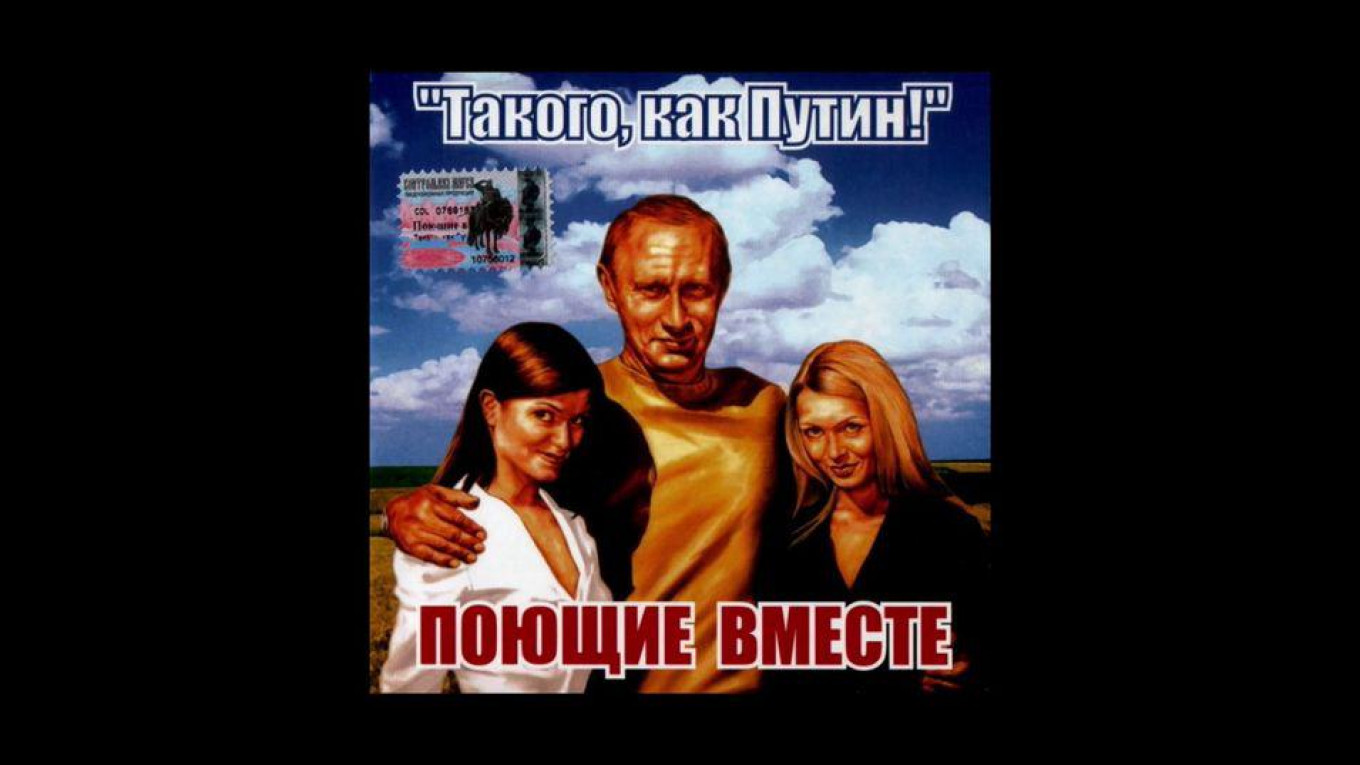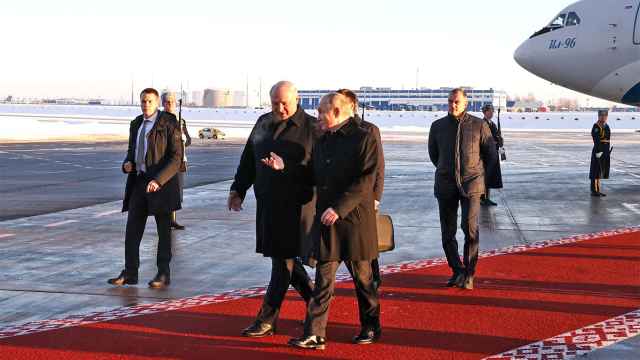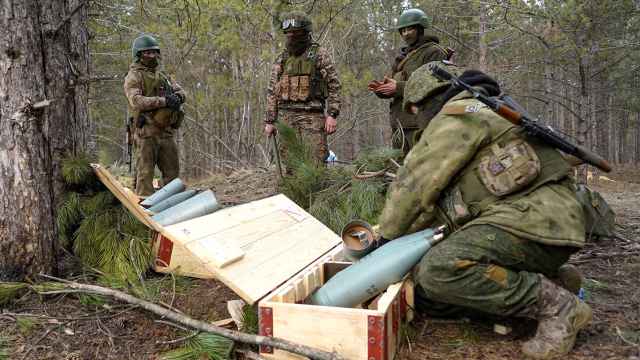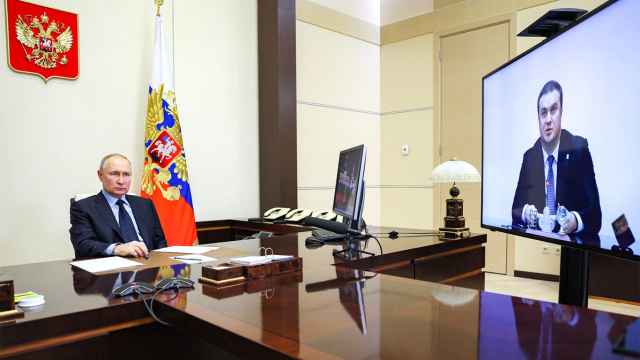A clutch of top Russian celebrities last week released a spritely pop song in support of President Putin ahead of presidential elections.
In a song titled “Guiding Star,” some of the most recognizable names in Russian pop music, including singer Grigory Leps, Eurovision winner and pop star Dima Bilan and rapper Timati, encourage Russians to vote for the incumbent on Sunday.
The Kremlin is tasked not only with ensuring a victory for Putin but also with making sure that a convincing number of Russians actually show up to vote. With the turnout steadily declining over past elections, it’s worth considering the role that music — including Putin’s dancy new number — has played in Russia’s political and ideological life.
The Soviet Union definitely had a golden era during which music helped rally citizens. The major role music played in communist propaganda and educating youth about the “correct” way of thinking is simply amazing.
While serious composers were actually required to write the occasional opera or ballet themed to the Russian Revolution, World War II or even the construction of hydroelectric power stations in Siberia, of course, the main focus was on the more accessible genre of pop music.
Propagandistic songs about Lenin, the Party and the Motherland made up between 20 and 30 percent of all music and accounted for at least half of all songs aired on radio and television. Some of these songs actually had outstanding melodies, were very moving and became popular hits despite their official status.
But this mass appeal disappeared almost overnight as if washed away by a giant wave in just one or two short years of perestroika and glasnost.
The fact that this huge genre of music ceased to exist speaks eloquently to the artificiality of this cultural-ideological hybrid and its inability to survive without state support. For many years, the Communist Party crooners simply disappeared from view. Think of Iosef Kobzon, who quickly switched gears to become a businessman, planted himself in the State Duma, and has been there ever since.
Rock was the soundtrack to Mikhail Gorbachev’s reforms. Previously considered anti-Soviet, the music of Aquarium, Kino, DDT and Nautilus Pompilius now aired with the same frequently as patriotic tunes like “The Party is Our Helmsman!” once had. Spirited and combative rock music provided the sole accompaniment to Muscovites’ protests against the August 1991 putsch, with many groups playing directly on the barricades.
In the newly transformed Russia of the 1990s, politics and music headed in opposite directions. Heroic rock lost its relevance. There was no connection whatever between the country’s political agenda and the decade’s stylish new pop songs, much less rave parties. Boris Yeltsin did not promote any particular musical ideology or order the great composers to create works glorifying the state.
The sole exception of the entire decade was the Yeltsin re-election campaign slogan-song “Vote or Lose” in 1996. To thwart the election bid of Communist Party leader Gennady Zyuganov – who led in the polls – Russian oligarchs, under the leadership of Boris Berezovsky, gathered a stack of money and literally bought off numerous famous performers of all types.
Everyone from folk musicians to DJs were paid to give concerts throughout the country under the banner of the Yeltsin campaign. Amazingly, some of them told me later they did not even realize who they were promoting at the time, but they all received large sums in cash.
After 2000, everything began changing according to a predictable pattern: leaders consolidated state authority, began searching for a national idea — an ideology around which they could rally the people — and gradually constructed a personality cult focused on Vladimir Putin. That required a return to the practices of the Soviet past.
State propaganda resurrected half-forgotten tricks and pro-government youth groups like Nashi were formed. That meant enlisting pop stars too.
In 2003, a girl band came out with a song called “One Like Putin” about how a young woman needs a boyfriend like Putin “who will respect her and won’t offend her.” It flopped and earned widespread derision.
Apparently, the heavy dose of songs for the masses from the recent past had made the Russian people immune to pop propaganda. The attempt was deemed a failure and all experimentation of that sort ceased for a decade.
Whereas the Soviet authorities issued certificates of loyalty to authors and performers who produced “politically correct” songs, they now bestow privileges on those who publicly praise the country’s leaders, demonstrate servility towards them and take part in public and private events for the elite.
The state remunerates them with airtime and performance fees. And singers are free to perform any song they want, even those devoid of “the Russian soul” — within limits, of course.
The Russian pop muses remained silent throughout most of the 2018 election campaign. This is understandable: practically no politicians, including the present batch of presidential candidates – with Putin being no exception – carry any particular authority in artistic circles.
In the case of “Guiding Star,” either the presidential administration gave the nod or else the pop stars themselves were overcome with the need to give voice to their loyalty.
The song is bad and the performance boring. Although, the lyrics never mention Putin’s name. But the allusion is clear: “Of a million stars, only one is true – the Guiding Star!”
The video garnered just 885,000 views, compared to 8.3 million views over the same three days for a new video by the group Leningrad. “Guiding Star” has approximately as many “dislikes” as “likes.” But most interesting, of course, is the commentary.
Many users noted that the singers included DJ Smash, whose jaw was broken by a drunken former Duma Deputy after the musician refused to appear in a selfie with the man. Others mentioned the well-known practice of Admiral Kolchak who, after his troops had liberated yet another city from the Bolsheviks during the Civil War, ordered them “not to bother the coachmen, prostitutes, or artists because they serve whoever is in authority.”
This begs a simple question. Are Russian performers ever motivated by sincere desire or selflessness to campaign for politicians and donate money to their causes?
The answer is no, it never happens. Or else, if there is such a performer, he or she has done a good job of remaining out of the public eye.
The creative community fared no better under Gorbachev and Yeltsin than it did under Medvedev and Putin, and so has not sung their praises without thought of reward. Why?
Because Russian politicians and statesmen have not earned their love or devotion. However, had opposition leader Alexei Navalny been permitted to participate in these elections, the situation might have been different.
Artemy Troitsky is a journalist and teacher in Tallinn, Estonia. The views and opinions expressed in opinion pieces do not necessarily reflect the position of The Moscow Times.
A Message from The Moscow Times:
Dear readers,
We are facing unprecedented challenges. Russia's Prosecutor General's Office has designated The Moscow Times as an "undesirable" organization, criminalizing our work and putting our staff at risk of prosecution. This follows our earlier unjust labeling as a "foreign agent."
These actions are direct attempts to silence independent journalism in Russia. The authorities claim our work "discredits the decisions of the Russian leadership." We see things differently: we strive to provide accurate, unbiased reporting on Russia.
We, the journalists of The Moscow Times, refuse to be silenced. But to continue our work, we need your help.
Your support, no matter how small, makes a world of difference. If you can, please support us monthly starting from just $2. It's quick to set up, and every contribution makes a significant impact.
By supporting The Moscow Times, you're defending open, independent journalism in the face of repression. Thank you for standing with us.
Remind me later.








